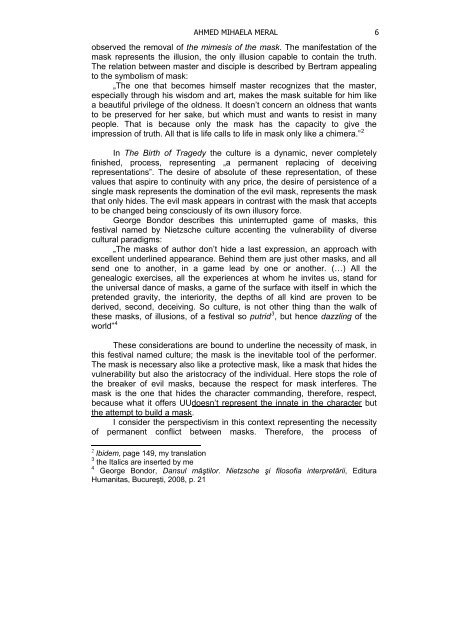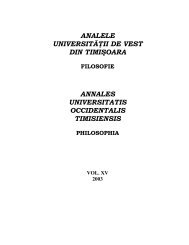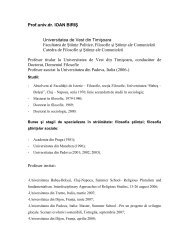VOL. IV (XXI) 2009 - Departamentul de Filosofie si Stiinte ale ...
VOL. IV (XXI) 2009 - Departamentul de Filosofie si Stiinte ale ...
VOL. IV (XXI) 2009 - Departamentul de Filosofie si Stiinte ale ...
Create successful ePaper yourself
Turn your PDF publications into a flip-book with our unique Google optimized e-Paper software.
AHMED MIHAELA MERAL 6<br />
observed the removal of the mime<strong>si</strong>s of the mask. The manifestation of the<br />
mask represents the illu<strong>si</strong>on, the only illu<strong>si</strong>on capable to contain the truth.<br />
The relation between master and disciple is <strong>de</strong>scribed by Bertram appealing<br />
to the symbolism of mask:<br />
„The one that becomes himself master recognizes that the master,<br />
especially through his wisdom and art, makes the mask suitable for him like<br />
a beautiful privilege of the oldness. It doesn’t concern an oldness that wants<br />
to be preserved for her sake, but which must and wants to re<strong>si</strong>st in many<br />
people. That is because only the mask has the capacity to give the<br />
impres<strong>si</strong>on of truth. All that is life calls to life in mask only like a chimera.” 2<br />
In The Birth of Tragedy the culture is a dynamic, never completely<br />
finished, process, representing „a permanent replacing of <strong>de</strong>ceiving<br />
representations”. The <strong>de</strong><strong>si</strong>re of absolute of these representation, of these<br />
values that aspire to continuity with any price, the <strong>de</strong><strong>si</strong>re of per<strong>si</strong>stence of a<br />
<strong>si</strong>ngle mask represents the domination of the evil mask, represents the mask<br />
that only hi<strong>de</strong>s. The evil mask appears in contrast with the mask that accepts<br />
to be changed being consciously of its own illusory force.<br />
George Bondor <strong>de</strong>scribes this uninterrupted game of masks, this<br />
festival named by Nietzsche culture accenting the vulnerability of diverse<br />
cultural paradigms:<br />
„The masks of author don’t hi<strong>de</strong> a last expres<strong>si</strong>on, an approach with<br />
excellent un<strong>de</strong>rlined appearance. Behind them are just other masks, and all<br />
send one to another, in a game lead by one or another. (…) All the<br />
genealogic exercises, all the experiences at whom he invites us, stand for<br />
the universal dance of masks, a game of the surface with itself in which the<br />
preten<strong>de</strong>d gravity, the interiority, the <strong>de</strong>pths of all kind are proven to be<br />
<strong>de</strong>rived, second, <strong>de</strong>ceiving. So culture, is not other thing than the walk of<br />
these masks, of illu<strong>si</strong>ons, of a festival so putrid 3 , but hence dazzling of the<br />
world” 4<br />
These con<strong>si</strong><strong>de</strong>rations are bound to un<strong>de</strong>rline the neces<strong>si</strong>ty of mask, in<br />
this festival named culture; the mask is the inevitable tool of the performer.<br />
The mask is necessary also like a protective mask, like a mask that hi<strong>de</strong>s the<br />
vulnerability but also the aristocracy of the individual. Here stops the role of<br />
the breaker of evil masks, because the respect for mask interferes. The<br />
mask is the one that hi<strong>de</strong>s the character commanding, therefore, respect,<br />
because what it offers UUdoesn’t represent the innate in the character but<br />
the attempt to build a mask.<br />
I con<strong>si</strong><strong>de</strong>r the perspectivism in this context representing the neces<strong>si</strong>ty<br />
of permanent conflict between masks. Therefore, the process of<br />
2<br />
Ibi<strong>de</strong>m, page 149, my translation<br />
3<br />
the Italics are inserted by me<br />
4<br />
George Bondor, Dansul măştilor. Nietzsche şi filosofia interpretării, Editura<br />
Humanitas, Bucureşti, 2008, p. 21




